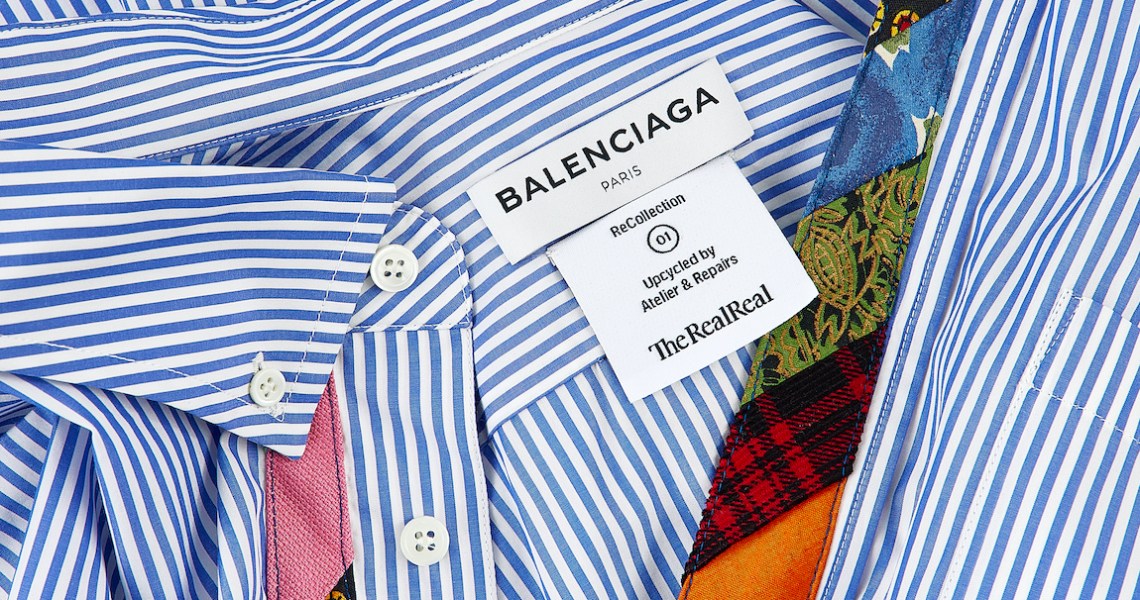The first iteration of resale company The RealReal’s upcycled collection of clothes, ReCollection 01, was created with the help of a third-party and made minimal repairs and alterations to damaged products donated from brands. But the second iteration of ReCollection, launching this holiday season, will see the company taking on the work of designing and releasing a collection in-house.
The second collection, made from scraps and materials upcycled from damaged products taken in by The RealReal, is currently being designed under the purview of the company’s newly established innovation lab, called the Circular ReSource Lab. The pieces are being more radically transformed, compared to those used in the first collection, offering no indication of what brands or products were used to create them.
While the lab is working on several projects simultaneously, its first focus will be on building up The RealReal’s in-house design capabilities, according to Allison Sommers, head of strategic initiatives at The RealReal.
“The point of the ReSource Lab is to test and learn, and make sure we’re investing in areas where we can move the needle environmentally,” Sommers said. “It made sense for us to work with an external partner for our first collection, but now that we’ve determined it’s a good use of resources, we can start investing more in these collections.”
Sommers said the lab will focus on three pillars: reimagining, reviving and reselling. Reimagining, like in the upcoming collection, will see The RealReal making more original pieces out of scraps and components from damaged goods. Reviving is about introducing repairs and alterations to its slate of services. Finally, reselling will see the lab looking for new ways to make transactions and reinvent the commerce side of the business.
Sommers said that the lab, which was formally established internally in April just after the first ReCollection, required minimal recruiting. Fewer than a dozen new people were hired to staff the lab, with the rest being pulled from the in-house tech and design teams.
Circularity is a big selling point for The RealReal’s customers, Sommers said. In surveys of The RealReal audience, 40% of consignors and 43% of buyers said that environmental impact is one of the most important motivations to use resale.
Ad position: web_incontent_pos1
“From 2019 to 2021, sustainability and environmental motivation saw the greatest gain in deciding factors for our customers,” Sommers said. “Value and brand selection are obviously important, but increasingly circularity is a big selling point for us.”
Brands like Madewell and Adidas have all introduced new initiatives around circularity in the last year, finding ways to take old and damaged products and remake them into something new and resellable. The rental company Nuuly launched a similar upcycled concept called Re_Nuuly in April that took old and damaged products and turned them into new styles. In addition to appealing to the conscious consumer’s desire for circularity, these initiatives can also offer an additional revenue source for brands to get the most out of products that would otherwise go to a landfill.
“We started to set aside damaged styles and put them into buckets such as denim, anything that was white, things with small but unremovable stains, etc.,” said Sky Pollard, Nuuly’s head of product. “We weren’t sure exactly what we were going to do yet, but we knew we wanted to make something out of the garments and give them a second life.”
For The RealReal, which saw its highest gross merchandise value ever at $350 million in the second quarter of 2021, ReCollection 02 will be the first step towards having more varied options for how to repurpose old clothes into new sales.
“Any item that can have a second life should have a second life,” Sommers said. “We want to have a place for all those items on our site.”




